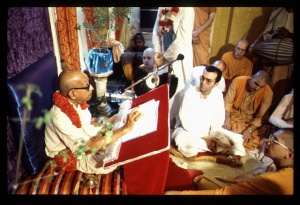CC Adi 7.80: Difference between revisions
m (1 revision(s)) |
No edit summary |
||
| Line 1: | Line 1: | ||
{{ | [[Category:Sri Caitanya-caritamrta - Adi-lila Chapter 07|C080]] | ||
<div style="float:left">'''[[Sri Caitanya-caritamrta|Śrī Caitanya-caritāmṛta]] - [[CC Adi|Ādi-līlā]] - [[CC Adi 7|Chapter 7: Lord Caitanya in Five Features]]'''</div> | |||
<div style="float:right">[[File:Go-previous.png|link=CC Adi 7.79|Ādi-līlā 7.79]] '''[[CC Adi 7.79|Ādi-līlā 7.79]] - [[CC Adi 7.81|Ādi-līlā 7.81]]''' [[File:Go-next.png|link=CC Adi 7.81|Ādi-līlā 7.81]]</div> | |||
{{CompareVersions|CC|Adi 7.80|CC 1975|CC 1996}} | |||
{{RandomImage}} | |||
==== TEXT 80 ==== | ==== TEXT 80 ==== | ||
<div | <div class="verse"> | ||
pāgala ha-ilāṅ āmi, dhairya nāhi mane | :pāgala ha-ilāṅ āmi, dhairya nāhi mane | ||
eta cinti’ nivediluṅ gurura caraṇe | :eta cinti’ nivediluṅ gurura caraṇe | ||
</div> | </div> | ||
| Line 12: | Line 16: | ||
==== SYNONYMS ==== | ==== SYNONYMS ==== | ||
<div | <div class="synonyms"> | ||
''pāgala''—madman; ''ha-ilāṅ''—I have become; ''āmi''—I; ''dhairya''—patience; ''nāhi''—not; ''mane''—in the mind; ''eta''—thus; ''cinti’''—considering; ''nivediluṅ''—I submitted; ''gurura''—of the spiritual master; ''caraṇe''—at his lotus feet. | |||
</div> | </div> | ||
| Line 19: | Line 23: | ||
==== TRANSLATION ==== | ==== TRANSLATION ==== | ||
<div | <div class="translation"> | ||
“I saw that I had become mad by chanting the holy name, and I immediately submitted this at the lotus feet of my spiritual master. | “I saw that I had become mad by chanting the holy name, and I immediately submitted this at the lotus feet of my spiritual master. | ||
</div> | </div> | ||
| Line 26: | Line 30: | ||
==== PURPORT ==== | ==== PURPORT ==== | ||
<div | <div class="purport"> | ||
Śrī Caitanya Mahāprabhu, as an ideal teacher, shows us how a disciple should deal with his spiritual master. Whenever there is doubt regarding any point, he should refer the matter to his spiritual master for clarification. Śrī Caitanya Mahāprabhu said that while chanting and dancing He had developed the kind of mad ecstasy that is possible only for a liberated soul. Yet even in His liberated position, He referred everything to His spiritual master whenever there were doubts. Thus in any condition, even when liberated, we should never think ourselves independent of the spiritual master, but must refer to him as soon as there is some doubt regarding our progressive spiritual life. | Śrī Caitanya Mahāprabhu, as an ideal teacher, shows us how a disciple should deal with his spiritual master. Whenever there is doubt regarding any point, he should refer the matter to his spiritual master for clarification. Śrī Caitanya Mahāprabhu said that while chanting and dancing He had developed the kind of mad ecstasy that is possible only for a liberated soul. Yet even in His liberated position, He referred everything to His spiritual master whenever there were doubts. Thus in any condition, even when liberated, we should never think ourselves independent of the spiritual master, but must refer to him as soon as there is some doubt regarding our progressive spiritual life. | ||
</div> | </div> | ||
__NOTOC__ | |||
<div style="float:right; clear:both;">[[File:Go-previous.png|link=CC Adi 7.79|Ādi-līlā 7.79]] '''[[CC Adi 7.79|Ādi-līlā 7.79]] - [[CC Adi 7.81|Ādi-līlā 7.81]]''' [[File:Go-next.png|link=CC Adi 7.81|Ādi-līlā 7.81]]</div> | |||
__NOTOC__ | |||
__NOEDITSECTION__ | |||
Revision as of 11:17, 7 July 2021

A.C. Bhaktivedanta Swami Prabhupada
TEXT 80
- pāgala ha-ilāṅ āmi, dhairya nāhi mane
- eta cinti’ nivediluṅ gurura caraṇe
SYNONYMS
pāgala—madman; ha-ilāṅ—I have become; āmi—I; dhairya—patience; nāhi—not; mane—in the mind; eta—thus; cinti’—considering; nivediluṅ—I submitted; gurura—of the spiritual master; caraṇe—at his lotus feet.
TRANSLATION
“I saw that I had become mad by chanting the holy name, and I immediately submitted this at the lotus feet of my spiritual master.
PURPORT
Śrī Caitanya Mahāprabhu, as an ideal teacher, shows us how a disciple should deal with his spiritual master. Whenever there is doubt regarding any point, he should refer the matter to his spiritual master for clarification. Śrī Caitanya Mahāprabhu said that while chanting and dancing He had developed the kind of mad ecstasy that is possible only for a liberated soul. Yet even in His liberated position, He referred everything to His spiritual master whenever there were doubts. Thus in any condition, even when liberated, we should never think ourselves independent of the spiritual master, but must refer to him as soon as there is some doubt regarding our progressive spiritual life.